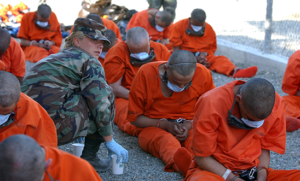After serving his term in the US-run detention center at Guantanamo Bay for nearly a year, a detainee who had been tortured while in CIA custody has been transported to Belize.
Majid Khan’s release, which brought the total number of prisoners at Guantanamo to 34, including 20 who are eligible for transfer, was announced by the Pentagon on Thursday. The 400,000-person nation in Central America is where Khan, who was abducted in Pakistan in 2003 and transferred to Guantanamo three years later, claimed he was eager to start a fresh chapter. “I feel like I was born again today. In a statement, Khan stated, “I have re-entered the world. I’ve been waiting so long to be free, and I’m still in a little bit of amazement that it’s occurred.
Khan, who attended secondary school in the US state of Maryland, went back to his native Pakistan following the 9/11 attacks and joined al-Qaeda.
In 2012, he entered a plea of guilty to charges of spying, conspiracy to commit murder, and “providing material support for terrorism”. The years he spent cooperating with US personnel were given credit when he was sentenced in 2021 to a period of imprisonment totaling more than 10 years, according to the Pentagon’s statement on Thursday. “He has since served out his sentence.” To accommodate prisoners taken during the “war on terror,” the Guantanamo detention center opened its doors in 2002.

The prison, which is housed within a US military post in Cuba, employs a legal system run by military tribunals that do not uphold the same rights as conventional US courts. While Washington searches for nations to accept them after their release, detainees who have been given the all-clear sometimes remain at Guantanamo for years.
Even while it was “wonderful” that Khan was released, other detainees who have been given the go-ahead for transfer have little options to hasten their release, according to Andy Worthington, a co-founder of the Close Guantanamo campaign. According to Worthington, the 20 guys who were permitted to be released “cannot go anywhere.” Their release truly depends only on the US government’s will. And that isn’t how it ought to be.
It’s an issue stemming from the fact that Guantánamo was built in an area where the law didn’t apply. The Pentagon was grateful to Belize on Thursday for helping with “ongoing US efforts focused on appropriately lowering the detainee population and ultimately shutting the Guantanamo Bay facility.”
In the past, the facility held up to 800 prisoners, many of whom had previously been held at secret CIA facilities known as “black sites” and tortured as part of a so-called “enhanced interrogation” program approved by the government of former President George W. Bush. Khan and other captives were subjected to various forms of torture at these facilities, according to a 2014 US Senate study.

According to Khan’s comments on Thursday, “I was a ghost, a walking dead man.” “The CIA desired that I stay in this state permanently. I often wished for death to end the horror and suffering while I was being tortured. The Center for Constitutional Rights, a legal advocacy organization, was “thrilled” by Khan’s release, according to Wells Dixon, a senior attorney there who represented Khan. Belize did an exceptional job of preparing for his resettlement, and their achievement serves as a model for other nations to take men who no one believes should remain at Guantanamo but who cannot return to their home countries for humanitarian reasons, Dixon said in a statement.
Days before the first-ever trip by an expert from the UN to Guantanamo, Khan was freed. The journey, which is anticipated to start the following week, will be conducted by Fionnuala Ni Aolain, the special UN rapporteur on the promotion and protection of human rights and fundamental freedoms while combatting terrorism. After the visit, she will present her findings and suggestions.
Pakistani prisoner detained for 16 years at Guantanamo Bay approved for release
Over the next three months, Ni Aolain will also speak with Guantanamo captives who were released as well as survivors of September 11, 2001, attacks in the US, according to the UN Human Rights Office.
- Misleading Video Alters Prime Minister Shehbaz’s Speech Targeting Political Rival, Not His Party - 21/04/2024
- ATC Grants Three-Day Remand for Suspects in Ichhra Bazaar Harassment Case - 19/03/2024
- Pakistan, India, and Bangladesh Lead World in Severe Smog Crisis, Exceeding WHO Guidelines - 19/03/2024


